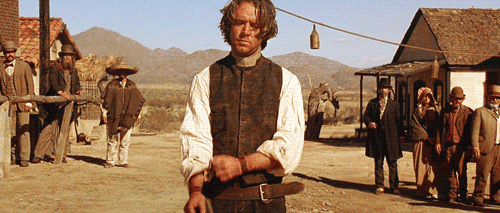This post is part of the General Conference Odyssey.
I was very struck by Elder Bruce R. McConkie’s statement in How to Worship that “[God] has planted in our hearts an instinctive desire to worship, to seek salvation, to love and server a power or being greater than ourselves.” I imagine it’s a claim that would strike many as controversial, but it brought to mind quotes about the role of the sacred in the lives of atheists and agnostics.
First, there’s Jonathan Haidt (an atheist) citing Mircea Eliade’s concept of “crypto-religious” behavior in The Happiness Hypothesis. The argument is that secularists have
privileged places, qualitatively different from all others — a man’s birthplace, or the scenes of his first love, or certain places in the first foreign city he visited in his youth. Even for the most frankly nonreligious man, all these places still retain an exceptional, a unique quality; they are the “holy places” of his private universe, as if it were in such spots that he had received the revelation of a reality other than that in which he participates through his ordinary daily life.[ref]The Happiness Hypothesis, page 193[/ref]
According to Haidt, Eliade captured his feelings perfectly: “Even atheists have intimations of sacredness, particularly when in love or in nature.”[ref]The Happiness Hypothesis, page 193.[/ref]
Haidt and Eliade are from alone in making this observation. The Bonobo and the Atheist
, Frans de Waal (also an atheist), describes how science can function as a religious pursuit:
Instead of turning to religion, the majority of us are agnostic or atheist. This shouldn’t be taken to mean that science answers questions of meaning and purpose, however. Even the scientists who recently confirmed the “God particle” knew that it was a far cry from confirming why we are on earth and even less whether or not God exists. No, the big difference for scientists is that the thirst for knowledge itself, the lifeblood of our profession, fills a spiritual void by religion in most other people. Like treasure hunters for whom the hunt is about as important as the treasurer itself, we feel great purpose in trying to pierce the veil of ignorance. We feel united in this effort, being part of a worldwide network. This means that we also enjoyed this other aspects of religion: a community of white-minded people. At a recent workshop, a retired astronomer teared up while discussing humanities place in the cosmos. He stopped talking for two minutes, causing his audience to become restless, before explaining that he had pursued this question since childhood. The site of images from billions of light-years ago still overwhelms him, making him realize how much we are connected with the universe. He wouldn’t call it a religious experience, but it sounded very much like it.[ref]The Bonobo and the Atheist, page 106[/ref]
If, as Eliade, Haidt, and Gleiser agree, there is a tendency towards the spiritual in all of us, then Elder McConkie’s second statement is also true:
The issue is not whether men shall worship, but who or what is to be the object of their devotions and how they shall go about paying the devotions to their chosen Most High.
Elder McConkie speaks fairly sternly about worshiping the wrong gods, and maybe a little too sternly. He says,
If a man worships a cow or a crocodile, he can gain any reward that cows and crocodiles happen to be passing out this season.
And also:
If he worships the laws of the universe or the forces of nature, no doubt the earth will continue to spin, the sun to shine, and the rains to fall on the just and on the unjust.
By contrast, however,
But if he worships the true and living God, in spirit and in truth, then God Almighty will pour out his Spirit upon him, and he will have power to raise the dead, move mountains, entertain angels, and walk in celestial streets.
I don’t disagree. I just think John Locke may add some perspective as well: “I have always thought the actions of men the best interpreters of their thoughts.” In other words, what we really believe–and what we really worship–is not so much about names or beliefs as it is about action. Which is exactly what Elder McConkie goes on to articulate with his extensive–and vitally important–list of worship examples.
To the extent that we know love, we also know an aspect of God. To the extent that we act on that love, we worship Him. And this is true, even if we do not mean to do so. It’s not about the words you say. It’s about the life you live.
Not every one that saith unto me, Lord, Lord, shall enter into the kingdom of heaven; but he that doeth the will of my Father which is in heaven.[ref]Matthew 7:21[/ref]
—
Check out the other posts from the General Conference Odyssey this week and join our Facebook group to follow along!
- LDS Conference October 1971- Elder Hinckley and Persistence in Faith (J. Max Wilson at Sixteen Small Stones)
- Worshiping the True and Living God (Daniel Ortner at Symphony of Dissent)
- On Worship, Practical, Contemplative, and Aesthetic-Humanitarian (Ralph Hancock at The Soul and The City)
- “[G]o and do” (Michelle Linford at Mormon Women)
- Emulating the Great Exemplar (Walker Wright at Difficult Run)
- Living by Power—A Woman of God (SilverRain at The Rains Came Down)
- If Ye Be Willing and Obedient (Chastity Wilson at Comfortably Anachronistic)
- “The World Needs a Bath in Christ’s Pure Religion” (Jan Tolman at LDS Women of God)


